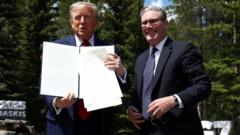Are Tariffs a True Triumph for Starmer, According to Chris Mason?

Analyzing the Political Dynamics of the G7 Summit: A Closer Look at Trump and Starmer’s Tariff Agreement
The G7 summit in the picturesque Canadian Rockies served as a backdrop for a pivotal moment in US-UK relations. Amid the sunshine and political theatrics characteristic of President Donald Trump, a significant tariff agreement was unveiled, showcasing the intricate dance of diplomacy. As the world watched, the meeting between President Trump and UK Prime Minister Sir Keir Starmer was filled with both promise and complexity. This article delves deep into the details of the tariff agreement, its implications for the aerospace and automotive industries, and its potential impact on UK farmers, while examining the broader political context surrounding this event.
The Tariff Agreement: A Summary of Key Points
The agreement reached between the US and UK officials focuses primarily on tariffs that have long been a point of contention in transatlantic trade relations. Here are the main highlights:
- Aerospace Industry: Tariffs on the aerospace sector will be entirely removed. This is a significant win for both the UK and US, as the aerospace industry is a major contributor to both economies.
- Automotive Industry: A 10% tariff has been established on the car industry. This is a critical area given the prominence of manufacturers like Jaguar Land Rover in the UK.
- Steel and Aluminium Tariffs: While the UK has been exempted from the global 50% tariff on steel and aluminium, a 25% tariff still remains. Negotiations continue to eliminate this, but challenges persist due to technical requirements regarding the origin of the steel.
- Beef Trade: There is an agreement for reciprocal access to 13,000 metric tonnes of beef, allowing British farmers to export to the US without compromising food safety standards.
The Political Landscape: Trump and Starmer's Meeting
The meeting between President Trump and Prime Minister Starmer was emblematic of the theatricality often associated with Trump’s political style. The scene unfolded dramatically when Trump accidentally dropped the papers detailing the tariff agreement, creating a moment that captured the essence of political theater. The quickness with which Starmer picked up the documents was not just a gesture of politeness; it was a symbolic act reflecting the importance of the agreement for the UK government.
The Implications for the UK Economy
The recent tariff agreement carries significant implications for the UK economy, particularly for specific sectors that have been heavily impacted by previous trade tensions. Here’s how different industries will be affected:
Aerospace Sector
The complete removal of tariffs on aerospace products is a major victory. The UK aerospace industry is one of the largest in the world, employing thousands and contributing billions to the economy. By eliminating these tariffs, the UK can strengthen its competitive position in the global market and potentially create more jobs.
Automotive Sector
The automotive industry is another critical area of focus. The introduction of a 10% tariff on cars means that while there is some relief, the sector still faces challenges. Jaguar Land Rover, a key player in the UK automotive landscape, has been particularly vulnerable to tariff fluctuations. The government’s proactive measures in visiting the Solihull plant underscore the urgency surrounding this issue.
Agricultural Sector
The agreement allowing British farmers to export beef to the US signifies a positive shift for the agricultural sector. This access could open new markets for UK beef, which may help offset the impacts of Brexit-related trade challenges. Ensuring that food safety standards remain intact is crucial for maintaining consumer confidence both domestically and abroad.
Challenges Ahead: The Technicalities of Steel Tariffs
While the tariff agreement includes many positive elements, the lingering 25% tariff on steel presents a significant hurdle. UK officials have highlighted that the exemption from the global 50% tariff is an achievement; however, the remaining tariff complicates matters. The crux of the issue lies in proving that steel was produced in the UK rather than merely imported and processed. This technical challenge requires robust documentation and verification processes, which can slow trade and impact industries reliant on steel.
The Broader Context: Domestic Political Implications
The timing of this agreement is particularly noteworthy given the domestic political challenges facing President Trump. His administration has faced scrutiny over various issues, and securing a trade deal with the UK can be seen as a win that may bolster his standing both at home and internationally. For Prime Minister Starmer, this achievement on the global stage offers a much-needed boost in credibility and political capital.
Impacts on International Relations
The agreement reached at the G7 summit illustrates the delicate balance of power in international relations, particularly between the US and UK. The dynamics of their partnership are continually evolving, influenced by domestic politics, economic pressures, and the broader geopolitical landscape.
Long-Term Strategic Interests
As both countries navigate the complexities of trade, the long-term strategic interests remain paramount. The US-UK relationship is not just about tariffs; it extends to defense, technology, and cultural ties. The ability to collaborate effectively in these areas will determine the strength of their alliance moving forward.
Conclusion: A Step Forward, But Not the Final Destination
In conclusion, the tariff agreement reached between President Trump and Prime Minister Starmer represents a significant step forward in US-UK trade relations. Despite the unconventional manner in which it was achieved, the benefits for the aerospace, automotive, and agricultural sectors cannot be understated. However, challenges remain, particularly regarding steel tariffs, which will require continued negotiation and diligence from both governments. As global trade continues to evolve, the ability of these two nations to adapt and collaborate will be crucial in ensuring mutual prosperity.
As we reflect on this moment, it is essential to consider the broader implications of such agreements and the ever-changing landscape of international relations. How will this agreement shape the future of US-UK trade, and what other challenges might arise in the coming months? Only time will tell.
FAQs
What are the main benefits of the US-UK tariff agreement?
The main benefits include the complete removal of tariffs on the aerospace industry, a 10% tariff on the automotive sector, and reciprocal access for British beef exports to the US.
How does the remaining steel tariff affect UK industries?
The remaining 25% steel tariff poses challenges for UK industries that rely on steel, as it complicates trade and could increase costs for manufacturers.
What are the implications for British farmers?
British farmers can now export beef to the US, which opens new market opportunities and could help mitigate the economic impacts of Brexit.
As we look forward to the future, what other international trade agreements do you think will emerge in the coming years? #TradeRelations #USTariffAgreement #UKPolitics
Published: 2025-06-17 04:22:18 | Category: technology



